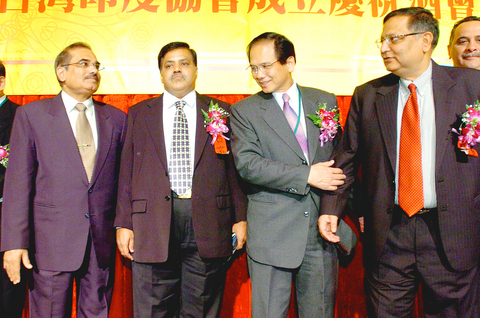The Taiwan-India Cooperation Council (TICC), a private organization with participation from businesses, the government and academics, was established yesterday in Taipei, with Democratic Progressive Party (DPP) Chair-man Yu Shyi-kun elected as its first chairman.
The council aims to act as a bridge to promote economic exchanges and broader cooperation on bilateral interests between Taiwan and India.
Yu said that the council's founding grows out of the government's "Go South" policy, which was proposed during Yu's tenure as premier.

PHOTO: SEAN CHAO, TAIPEI TIMES
The policy emphasizes India as an ideal investment destination for Taiwanese businesses and as a way to decrease their reliance on the China market alone.
"India is seen as having the best potential among the four golden `BRIC' [Brazil, Russia, India and China] countries. Besides, Taiwan and India's collaboration in software and hardware and India's overall economic takeoff will provide even more opportunities for Taiwan-India economic and trade cooperation," Yu said.
Yu said the idea to promote closer Taiwan-India exchanges is in line with the Indian government's "Look East policy," which overlaps with Taiwan's "Go South Policy."
Brigadier Arun Sahgal, the deputy director of India's United Service Institution, who formerly served in India's defense department, attended the council's founding ceremony yesterday. He said the council provides a channel for India to reach out to East Asia, a policy the Indian government has been working toward in recent years.
"India's `Look East Policy' engages mostly with Southeast Asia, but India is looking for much greater engagement with East Asia. It is in this context that our relationship with Taiwan is extremely important. We would like to use our new-found confidence and new-found economic development model to engage to a much greater degree with Taiwan," Sahgal said.
Commenting on the possibility of extending cooperation beyond economic matters, Sahgal said "as our economic interests in Taiwan increase, we'll be [more] interested and involved in the security and stability of the region."
Sahgal added that India would certainly pursue more strategic dialogue with Taiwan as its exchanges increase.
"Once we have the trade, we'll develop our interests in the security and safety of Taiwan to protect our own trade," he said.
Dilip Amarnani, a businessman and director of Taipei's Indian Overseas Compatriot Association, said yesterday that an important business opportunity that India offers, in contrast to China, is its strong middle-class market comprising 300 million citizens -- a convincing point for Taiwanese businesspeople, who wouldn't have to seek other export markets as much as they have to do with their operations in China.
"When the Taiwanese go to China, they are going to produce goods to export. You are not sure whether you'll find a market there. But in India, you already have a market within India itself. You don't have to look around for other markets," Amarnani said.
The amount of Taiwan-India bilateral trade reached US$1.93 billion in 2004, which is five times more than the 1990 bilateral trade figures.
The bilateral cooperation projects are mainly in the high-tech sector. There are now more than 1,000 Indian engineers in Taiwan.

Alain Robert, known as the "French Spider-Man," praised Alex Honnold as exceptionally well-prepared after the US climber completed a free solo ascent of Taipei 101 yesterday. Robert said Honnold's ascent of the 508m-tall skyscraper in just more than one-and-a-half hours without using safety ropes or equipment was a remarkable achievement. "This is my life," he said in an interview conducted in French, adding that he liked the feeling of being "on the edge of danger." The 63-year-old Frenchman climbed Taipei 101 using ropes in December 2004, taking about four hours to reach the top. On a one-to-10 scale of difficulty, Robert said Taipei 101

A preclearance service to facilitate entry for people traveling to select airports in Japan would be available from Thursday next week to Feb. 25 at Taiwan Taoyuan International Airport, Taoyuan International Airport Corp (TIAC) said on Tuesday. The service was first made available to Taiwanese travelers throughout the winter vacation of 2024 and during the Lunar New Year holiday. In addition to flights to the Japanese cities of Hakodate, Asahikawa, Akita, Sendai, Niigata, Okayama, Takamatsu, Kumamoto and Kagoshima, the service would be available to travelers to Kobe and Oita. The service can be accessed by passengers of 15 flight routes operated by

Taiwanese and US defense groups are collaborating to introduce deployable, semi-autonomous manufacturing systems for drones and components in a boost to the nation’s supply chain resilience. Taiwan’s G-Tech Optroelectronics Corp subsidiary GTOC and the US’ Aerkomm Inc on Friday announced an agreement with fellow US-based Firestorm Lab to adopt the latter’s xCell, a technology featuring 3D printers fitted in 6.1m container units. The systems enable aerial platforms and parts to be produced in high volumes from dispersed nodes capable of rapid redeployment, to minimize the risk of enemy strikes and to meet field requirements, they said. Firestorm chief technology officer Ian Muceus said

MORE FALL: An investigation into one of Xi’s key cronies, part of a broader ‘anti-corruption’ drive, indicates that he might have a deep distrust in the military, an expert said China’s latest military purge underscores systemic risks in its shift from collective leadership to sole rule under Chinese President Xi Jinping (習近平), and could disrupt its chain of command and military capabilities, a national security official said yesterday. If decisionmaking within the Chinese Communist Party has become “irrational” under one-man rule, the Taiwan Strait and the regional situation must be approached with extreme caution, given unforeseen risks, they added. The anonymous official made the remarks as China’s Central Military Commission Vice Chairman Zhang Youxia (張又俠) and Joint Staff Department Chief of Staff Liu Zhenli (劉振立) were reportedly being investigated for suspected “serious